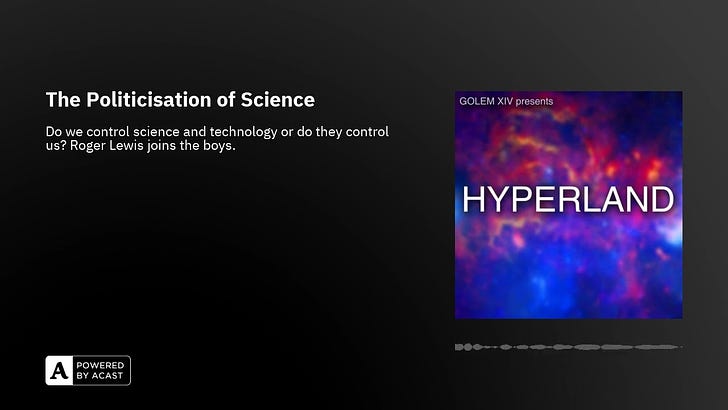On Line Flip Book. Grub street journal summer 2025
Text To Voice Video with pictures.
PDF with embedded Links to Financial mis-deads and Perps.
The Going Direct Paradigm has failed. The die hard cultists like Kier Starmer default to a War Mongering setting. As I write this a banner meme is directly below this window. “Putin will invade Europe” is the new “Iraq has weapons of mass - destruction”.
My own view Frances is one I share with Lewis Mumford. “The Gates of the technocratic prison will inspite of their ancient and rusty hinges still open, as long as we are prepared to walk out”
“The technotronic era involves the gradual appearance of a more controlled society. Such a society would be dominated by an elite, unrestrained by traditional values. Soon it will be possible to assert almost continuous surveillance over every citizen and maintain up-to-date complete files containing even the most personal information about the citizen. These files will be subject to instantaneous retrieval by the authorities. ”
― Zbigniew Brzezinski, grubstreetinexile.subst…
"Shortly, the public will be unable to reason or think for themselves. They'll only be able to parrot the information they've been given on the previous night's news." -Zbigniew Brzezinski in 1972
"Shortly, the public will be unable to reason or think for themselves. They'll only be able to parrot the information they've been given on the previous night's news." -Zbigniew Brzezinski in 1972
The Marketplace of Mindlessness
In the great bazaar of modern media, where attention is both currency and commodity, we find ourselves in what Chesterton might have called "the marketplace where nothing is sold but the selling itself." The revelation from Gielen's analysis that nine media conglomerates control 90% of international media presents us with a peculiar modern paradox: the illusion of choice masking the reality of monopoly.
The way out begins with what Charlton calls "the recovery of attention." This is not merely a matter of reducing our media consumption but of fundamentally altering our relationship with information itself. It requires what Chesterton might have termed "the courage to be unfashionably focused" - to resist the constant pull of the next notification, the next crisis, the next distraction.
"Of course it's funny but not out loud".
“A fiction that elevates my soul is dearer to me than a host of base and despicable truths”. Pushkin. "Fake News" Trumps flip flop to the Golden Turd, V Junta Biden (pronounced Hunter)
The "Going Direct" Paradigms Failure. with help from Common Sense.
Conclusion: The Path Forward
In conclusion, my friends, the "Going Direct" paradigm serves as a cautionary tale—a reminder that in our quest for efficiency and control, we must not lose sight of the principles that underpin our society. We must strive for a future where the economy serves the people, not the other way around. Let us take inspiration from Paine, who dared to challenge the status quo and envision a world where liberty and justice prevail. For in this great endeavor, we find not only our purpose but our very humanity.
Reasons to be Cheerfull, Parts 1, 2, 3.
Going Direct is(n't) Working its failures are features not Bugs. Say no to the Money Shuffle! and Wake up!
Reasons to be Cheerfull, Parts 1, 2, 3.
Ivan Albright's: "Into the world there came a soul called Ida"
Trilateral Commision and Technocracy
From 2013 , Patrick Wood of Technocracy news
technocracy.news Founded in 1973 by David Rockefeller and Zbigniew Brzezinski, the Trilateral Commission embarked on a New International Economic Order based on Technocracy. Brzezinski called this the "Technetronic Era" in his 1970 book, Between Two Ages. History now reveals the original Trilateral strategy and the means by which they have carried it out. Publicerades den 5 nov. 2013 technocracy.news
The Trilateral Commission and Technocracy (2013)
on You tube both 55mins long
The Going Direct Paradigm: A Cautionary Tale
The Failure of the Going Direct Paradigm
The Going Direct Paradigm has failed. The die-hard cultists like Kier Starmer default to a war-mongering setting. As I write
this, a banner meme is directly below this window: “Putin will invade Europe” is the new “Iraq has weapons of mass
destruction.”
A Vision Shared with Lewis Mumford
My view aligns with that of Lewis Mumford: “The gates of the technocratic prison will, despite their ancient and rusty hinges,
still open as long as we are prepared to walk out.”
Zbigniew Brzezinski warned us:
“The technotronic era involves the gradual appearance of a more controlled society... Such a society would be dominated by an
elite, unrestrained by traditional values.”
The Marketplace of Mindlessness
In the great bazaar of modern media, where attention is both currency and commodity, we find ourselves in what Chesterton
might have called "the marketplace where nothing is sold but the selling itself." Gielen's analysis reveals that nine media
conglomerates control 90% of international media, presenting a paradox: the illusion of choice masking the reality of
monopoly.
Recovery of Attention
The way out begins with what Charlton calls "the recovery of attention." This is not just about reducing media consumption; it
requires fundamentally altering our relationship with information. It demands the courage to be unfashionably focused—
resisting the constant pull of notifications and distractions.
A Fiction that Elevates the Soul
Pushkin once said, “A fiction that elevates my soul is dearer to me than a host of base and despicable truths.” In today's
landscape, "Fake News" often trumps the reality we face.
Conclusion: The Path Forward
In conclusion, the "Going Direct" paradigm serves as a cautionary tale—a reminder that in our quest for efficiency and control,
we must not lose sight of the principles that underpin our society. We must strive for a future where the economy serves the
people, not the other way around. Let us take inspiration from Paine, who dared to challenge the status quo and envision a
world where liberty and justice prevail.
Reasons to Be Cheerful
Reasons to be Cheerfull, Parts 1, 2, 3.
Ivan Albright's: "Into the world there came a soul called Ida"
Going Direct is(n't) working; its failures are features, not bugs. Say no to the money shuffle and wake up!
Further Reading
• The Trilateral Commission and Technocracy (2013)
Founded in 1973 by David Rockefeller and Zbigniew Brzezinski, the Trilateral Commission embarked on a New
International Economic Order based on Technocracy. Brzezinski called this the "Technetronic Era" in his 1970 book,
Between Two Ages.
• Watch on Bitchute
• Watch on YouTube (55 mins long)
The Ethical Landscape of Usury: A Comprehensive Reflection by G.K.
Chesterton
Introduction: Understanding Usury
Ah, usury! The very word evokes a sense of moral outrage, a specter that has haunted the corridors of economic thought for
centuries. As I sit to reflect on this age-old practice of charging excessive interest on loans, I am reminded of the profound
moral, social, and economic implications it carries. Usury is not merely a financial term; it is a concept steeped in ethical
debates that reflect the values and beliefs of our societies. From the ancient civilizations that first grappled with its
implications to our modern discussions surrounding lending practices, the ethical considerations of usury have evolved,
shaped by religious doctrines, philosophical insights, and economic realities.
In this discourse, I shall weave together the timeline of ethical thinking on usury, drawing upon the wisdom of influential
thinkers such as Aristotle, Aquinas, Bentham, and Smith. I will also integrate these reflections with Bernard Lietaer’s integral
analysis of money, which provides a multifaceted framework for understanding the complex interplay between individual
beliefs, collective norms, and institutional practices related to usury.
Timeline of Ethical Thinking on Usury
Ancient Times
In Mesopotamia, circa 2000 BCE, we find early records indicating that interest was charged on loans, yet excessive interest
was frowned upon. The Code of Hammurabi, that ancient legal framework, regulated interest rates, reflecting a societal
concern about exploitation. Here, we see the seeds of ethical consideration being sown, as the ancients recognized the need for
balance in economic transactions.
Moving to Ancient Greece, around 400 BCE, philosophers like Aristotle criticized usury, viewing it as unnatural since money
itself does not generate value. Aristotle’s ethical framework emphasized virtue and the role of money as a means of exchange
rather than a source of profit. His arguments laid the groundwork for later critiques of usury, framing it as a moral failing.
Middle Ages
The Christian Church, from circa 300 to 1500 CE, condemned usury, defining it as the charging of interest on loans. Key figures
such as St. Augustine and St. Thomas Aquinas argued that money should facilitate exchange, not profit. Aquinas, in particular,
asserted that usury was a sin, as it violated the natural law governing human relationships. In parallel, Islamic law, emerging
around 600 CE, explicitly prohibited riba (usury), leading to the development of Islamic finance principles that encourage risk-
sharing and profit-sharing instead.
Renaissance to Enlightenment
During the Renaissance, from the 14th to the 17th century, we witnessed a gradual relaxation of usury laws in Christian
Europe. Thinkers like John Calvin argued for a more pragmatic approach, allowing interest under certain conditions,
particularly if it served the common good. This marked the beginning of a more flexible understanding of economic practices.
In the 18th century, Jeremy Bentham published his pamphlet Defence of Usury in 1787, arguing that charging interest is a
natural and necessary part of economic transactions. He contended that usury laws hindered economic growth and that
individuals should be free to negotiate interest rates. Bentham sought to persuade Adam Smith, who held a critical view of
usury, through correspondence, arguing that Smith's ethical stance was overly simplistic and detrimental to economic progress.
Modern Era
As we entered the 19th century, legal reforms in many countries began to allow interest, reflecting the growing acceptance of
capitalism and financial markets. The debates on usury continued into the 20th century, with various religious institutions re-
evaluating their positions. For example, some Protestant denominations began to accept interest as a necessary component of
modern economies.
In the 21st century, we find ourselves amidst ongoing discussions about predatory lending practices and the ethical
implications of high-interest loans. Movements advocating for fair lending practices challenge traditional views on usury,
emphasizing the need for ethical standards in financial transactions.
Integrating the Timeline into Lietaer’s Integral Analysis of Money
Now, let us consider how this timeline of usury fits into Bernard Lietaer’s integral analysis of money, which categorizes
knowledge into four quadrants: Interior-Individual, Interior-Collective, Exterior-Individual, and Exterior-Collective.
Interior-Individual
In Bentham's defense of usury, we see a shift in individual ethical reasoning, emphasizing rational self-interest and the utility
of financial transactions. His utilitarian perspective argues that the benefits of allowing interest outweigh the moral objections,
facilitating economic growth and personal freedom. In contrast, Smith’s opposition to usury stems from a moralistic view,
emphasizing potential exploitation and social harm. His ethical concerns highlight the psychological and moral dimensions of
individual behavior in economic contexts.
Interior-Collective
The contrasting views of Bentham and Smith illustrate the tension within collective beliefs about money and ethics. While
Bentham sought to challenge and change prevailing norms regarding usury, Smith's views reflect the dominant moral
framework upheld by many religious and philosophical traditions of the time. The influence of religious institutions,
particularly the Christian Church and Islamic law, shaped collective beliefs about usury, significantly impacting societal norms
and values regarding money, debt, and morality.
Exterior-Individual
The evolution of legal frameworks around usury demonstrates how individual actions and decisions regarding lending
practices have changed over time. Bentham’s advocacy for usury contributed to the gradual legal acceptance of interest in the
evolving capitalist economy, showcasing how individual thinkers can influence broader economic practices and legal reforms.
Exterior-Collective
The debates surrounding usury, supported by Bentham’s works, reflect the shifting governmental approaches to financial
regulation in response to changing societal values and economic needs. The transition from condemnation to acceptance of
interest illustrates broader economic theories and practices that emerged during the Renaissance and Enlightenment.
Conclusion
By analyzing the ethical thinking on usury through Lietaer’s integral framework, we can see how both individual beliefs and
collective norms have evolved in response to changing economic landscapes. The integration of Jeremy Bentham’s defense of
usury, Adam Smith’s critiques, and the influence of the Whig Party highlights the complex interplay between ethical
considerations and financial practices throughout history.
G.K. Chesterton’s Imagined Sequel to Utopia of Usurers
In an imagined sequel to G.K. Chesterton’s Utopia of Usurers, the narrative might unfold as follows:
Key Themes
Plutocracy and Exploitation: Chesterton’s characters would explore how the very system that impoverishes individuals uses
that impoverishment as justification for further control and enslavement. The analogy of a highwayman handing over a victim
to the police for being destitute serves as a critique of modern economic systems that perpetuate inequality while claiming to
uphold justice.
Eugenics and Pseudo-Science: The narrative critiques the emerging reliance on pseudo-scientific justifications for economic
policies, paralleling modern discussions about the ethical implications of technology and governance.
Quote from Chesterton
"The key fact in the new development of plutocracy is that it will use its own blunder as an excuse for further crimes." – Utopia
of Usurers.
Modern Parallels
The themes of economic control and the ethical implications of financial practices resonate with contemporary discussions
around Central Bank Digital Currencies (CBDCs), carbon currencies, and the implications of corporate influence in politics, as
highlighted by Roger Lewis. The historical context of usury laws and the evolving ethical frameworks surrounding lending
practices provide a rich backdrop for these modern debates.
Final Thoughts
This analysis not only traces the historical evolution of ethical thinking on usury but also highlights the relevance of these
discussions in contemporary contexts, illustrating the enduring struggle for economic justice and ethical governance. The
integration of Chesterton’s critique underscores the importance of examining the moral implications of our economic systems
as we navigate the complexities of modern financial landscapes.
“Remember that we sometimes demand explanations for the sake not of their content, but of their form. Our requirement is an architectural one; the explanation a kind of sham corbel that supports nothing.”
― Ludwig Wittgenstein, Philosophical Investigations
“Remember that we sometimes demand explanations for the sake not of their content, but of their form. Our requirement is an architectural one; the explanation a kind of sham corbel that supports nothing.”
― Ludwig Wittgenstein, Philosophical Investigationst
Shibboleth, Guernica as metaphor for Gaza, Hasbara
Gaza as simile for Guernica. "Hasbara" as metaphor?
Dresden?
Guernica as metaphor for Gaza
Gaza as simile for Guernica
"Hasbara" as metaphor?
"Hasbara" as Simile?
“the sharper lens, removable'
brings the images home to you”
Roger G Lewis 2025
Storyline What happened after the big banks were bailed out by taxpayers in 2008? Spank the Banker is a feature-length documentary film about the biggest bank heist in history - as global financial capitalism sought to re-build its profits. The film follows the intimate stories of six ordinary but courageous individuals who refused to be intimidated and fought back against a corrupt financial system. For the first time, this film gives a voice to those thousands who were scammed and exposes in detail the vast corporate criminal conspiracy to defraud them. Tens of thousands of people were forcibly bankrupted and £100 billion of their assets stolen, destroying families and driving some to suicide. British politicians deliberately turned a blind eye to this massive fraud in case it threatened economic recovery. Meanwhile bank executives fired internal whistle-blowers, falsified documents and used legal blackmail to block exposure of their actions. The major British television networks limited ... https://www.imdb.com/title/tt10917024/?ref_=ttpl_pl_tt
For those who can not access Bitchute , I have embedded the film in the Flip book .
Farside 1994 30th anniversay edition of Horizon. DISCUSSED ON Hyperland Blog.
Recorded 3 sundays ago, i enjoyed talking with David and Ian on the Hyperland pod.
The discussion covers the influence of military technology on scientific research, the control of information through the internet, and the implications of overpopulation and eugenics, highlighting the politicization of science.
Detailed Summary for [The Politicisation of Science](
by [Monica](https://monica.im)
[00:03](
Discussion about a film review and the guest's involvement in the Hyperland community
- Introducing the special guest, Roger Lewis, and the reasons for having him on the show}
- Roger's previous experience watching and reviewing the film 'The Far Side' discussed}
- Acknowledging Roger's informed perspective and welcoming him as a listener to the show}
[07:25](
Discussion on the politicization of science and technology
- The importance of controlling science and technology}
- The central core of the discussion according to Tony Ben}
- The main driver of technological research being military technology}
- Questioning the power and authority in society}
- People giving up personal agency to authority}
[14:53](
The discussion revolves around the politicization of science and the impact it has on experts and society.
- Discussion on manipulating people's behavior using a metaphor from a novel}
- Challenges to the scientific narrative and the influence of experts}
- Reference to the concept of 'Science Republic' and the critique of scientism}
[22:21](
Discussion on the limitations of hard materialists and dogmatic scientists in setting boundary conditions
- Exploring the concept of exponential and its significance to materialists}
- Critique on dogmatic scientists for closing off boundary conditions}
- Reference to Godel's incompleteness theorem and undecidability}
- Connection to dangerous knowledge and philosophical studies}
[29:49](
The internet and social media are designed as Skinner boxes to influence behavior
- The internet and social media are designed to manipulate user behavior}
- Social media platforms like Facebook are intentionally created as Skinner boxes}
- The access to information and communication on the internet is controlled and monitored}
[37:14](
Discussion on the impact of politicization on science and society
- Reflecting on the belief that things can only improve}
- Exploring the themes of democracy, control, and societal changes}
- Narrative of a farmer facing challenges with seed affordability}
- Historical references to Solon's reforms and agrarian reform under Roman law}
[44:45](
Discussion on the politicization of science and funding sources
- Mention of population, GM crops, overpopulation, depopulation, and eugenics}
- Rockefeller Foundation as a major funder of science and economics}
- Questioning the underlying ideology of funding outside of traditional institutional structures}
- Criticism of following the science blindly during the COVID-19 pandemic}
[52:13](
Discussion on the politicization of science and overpopulation
- Discussion on the essay title 'not counting the nword'}
- Linking overpopulation to imperialist white supremacy}
- Eugenics and the idea of a master race}
- Debate on the impact of overpopulation and control}
- Personal experience leading to an essay on overpopulation}



















